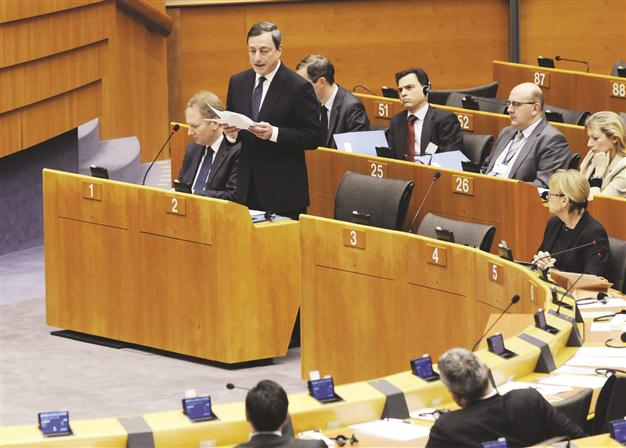EU’s top central banker urges closer integration
BRUSSELS - The Associated Press

The President of the European Central Bank Mario Draghi addresses the European Parliament in Brussels yesterday. AFP photo
European Central Bank (ECB) chief Mario Draghi said yesterday the 17 countries that use the euro must tether their economies more tightly to avoid a repeat of the debt crisis that is threatening the global financial system.
He also hinted that the ECB may play a more pivotal role in the resolution of the crisis, but he insisted that the governments must first back proposals to align their budgetary policies.
“Other elements might follow, but the sequencing matters,” Draghi told the European Parliament. “And it is first and foremost important to get a commonly shared fiscal compact right.
“Confidence works backwards: if there is an anchor in the long term, it is easier to maintain trust in the short term,” he added. “After all, investors are themselves often taking decisions with a long time horizon, especially with regard to government bonds.”
Draghi’s speech came amid growing speculation Europe is readying a plan to tie the eurozone closer together with stricter budgetary rules. That, analysts said, could allow the ECB to take a more central role in the crisis
The ECB cannot lend directly to governments, including by buying their national bonds. It can, however, buy national bonds on the secondary market, lowering borrowing costs for governments. But it has resisted such action because it believes that would take the pressure off politicians to cut spending.
A summit of EU leaders on Dec. 9 is expected to focus on how to make the eurozone more unified. The markets think that the eurozone has little choice but to back proposals for much closer coordination of their spending and budget policies.
Numerous violationsSince the euro was established in 1999, the rules governing the eurozone have been fairly lax. A “commitment” for countries to keep their budget deficits in check was violated on numerous occasions, including by Germany, Europe’s biggest economy.
Greece was perhaps the biggest culprit and it’s had to be bailed out, as have Ireland and Portugal. The big worry in the markets at the moment is that Italy, with its debt mountain of 1.9 trillion euros ($2.55 trillion) is just too big to bail out under current rules.
Draghi said Wednesday’s joint intervention by the world’s leading central banks to make dollars more easily available is only a temporary measure. The move was wildly-cheered in the markets.
The coordinated action by central banks will ease borrowing, but it does little to solve the underlying problem of mountains of government debt in Europe, leaving markets still waiting for a permanent fix.
Potentially, the ECB has unlimited financial firepower through its ability to print money. However, Germany finds the idea of monetizing debts unappealing, warning that it lets the more profligate countries off the hook for their bad practices. In addition, it conjures up bad memories of hyperinflation in Germany in the 1920s.
